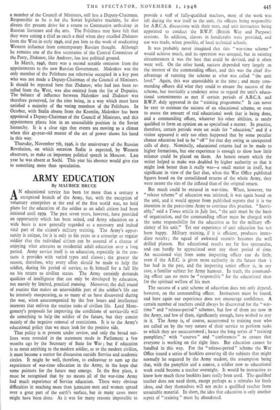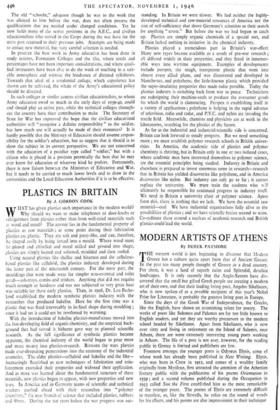ARMY EDUCATION
By MAURICE BRUCE
AN educational service has been for more than a century a recognised branch of the Army, but, with the exception of voluntary enterprises at the end of the first world war, no bold plans for the education of the soldier as an adult citizen had been initiated until 1939. The past seven years, however, have provided an opportunity which has been seized, and Army education on a wide basis is now generally regarded as a necessary and indeed vital part of the citizen's military training. The Army's oppor- tunity is unique, for it is only in his years as a conscript or regular soldier that the individual citizen can be assured of a chance of enjoying what amounts to residential adult education over a long period. Army service itself is an education, especially in the con- tacts it provides with varied types and classes ; the greater the reason, therefore, why every effort should be made to help the soldier, during his period of service, to fit himself for a full life on his return to civilian status. The Army certainly demands qualities of intelligence that can only be developed by education, not merely by limited, practical training. Moreover, the dull round of routine that makes an unavoidable part of the soldier's life can be intensely exasperating, as so many of us have discovered during the war, when unaccompanied by the free hours and intellectual interests that enliven the routine tasks of civilian life. Lord Mont- gomery's proposals for improving the conditions of service-life will do something to help the soldier of the future, but they consist mainly of the negative removal of restrictions. It is to the Army's educational policy that we must look for the positive side.
That policy is at present under review, and only the broad out- lines were revealed in the statement made in Parliament a few months ago by the Secretary of State for War ; but if education is to mean anything to the modern soldier, as to the modern civilian, it must become a matter for discussion outside Service and academic circles. It might be well, therefore, to endeavour to sum up the experiences of war-time education in the Army, in the hope that some pointers for the future may emerge. In the first place, it must be recognised that by no means all of the war-time Army had much experience of Service education. There were obvious difficulties in reaching more than 3,000,000 men and women spread over a great part of the earth's surface, but in many cases more might have been done. As it was for many reasons impossible to provide a staff of fully-qualified teachers, most of the work was left during the war itself to the unit, the officers being responsible for A.B.C.A. discussions with their men, and unit instructors being appointed to conduct the B.W.P. (British Way and Purpose) sessions. In addition, classes in handicrafts were provided, and use was made, when possible, of local technical schools.
It was probably never imagined that this " war-time scheme " would achieve much, and its operation was unequal, but in existing circumstances it was the best that could be devised, and it often went well. On the other hand, success depended very largely on the interest of the commanding officer, and this was the chief dis- advantage of running the scheme at what was called " the unit level." Again, this was unavoidable at the time ; and many com- manding officers did what they could to ensure the success of the scheme, but inevitably a tendency arose to regard the unit's educa- tional commitments as met if certain periods of A.B.C.A. and B.W.P. duly appeared in the " training programme." It can never be easy to estimate the success of an educational scheme, or even to assess the amount of real educational work that is being done, and a commanding officer, whatever his other abilities, is rarely qualified to form an opinion on so specialised a matter. In practice, therefore, certain periods were set aside for "education," and if a visitor appeared it only too often happened that by some peculiar chance education had to be "off " for that day owing to unexpected calls of duty. Nominally, educational returns had to be made to higher formations, but one experience is enough to show how little reliance could be placed on them. An honest return which the writer helped to make was doubled by higher authority so that it might look better than it really was—a small matter in itself, but significant in view of the fact that, when the War Office published figures based on the consolidated returns of the whole Army, they were nearer the size of the inflated than of the original return.
But much could be excused in war-time. When, however, the " release scheme" of education was initiated, it was again based un the unit, and it would appear from published reports that it is the intention in the peace-time Army to continue this practice. " Inevit- ably," said a Times article in July last, " the unit must be the basis of organisation, and the commanding officer must be charged with the same responsibility for the education as for the military effi- ciency of his unit." Yet our experience of unit education has riot been happy. Military training, if it is efficient, produces imme- diate results ; the squad of awkward recruits becomes the well drilled platoon. But educational results are far less spectacular, and can hardly be appreciated over any short period of time. An occasional visit from some inspecting officer can do little, even if the A.E.C. is given more authority in the future than 't has had in the past, and the inspecting senior officer is, in any case, a familiar subject for Army humour. In truth, the command- ing officer can no more be " responsible " for the educational than for the spiritual welfare of his men.
The success of a unit scheme of education does not only depend, however, on the commanding officer. Instructors must be found, and here again our experience does not encourage confidence. A certain number of teachers could always be discovered for the " war- time " and " release-period " schemes, but few of them are now in the Army, and few of them, significantly enough, have wished to stay in it. The Army is, of course, accustomed to training men who are called on by the very nature of their service to perform tasks to which they are unaccustomed ; hence the long series of " training pamphlets," with "courses" and " conferences " to ensure that everyone is working on the right lines. But education cannot be handled in this way. For the "release-period" scheme the War Office issued a series of booklets covering all the subjects that might normally be required by the Army student, the assumption being that, with the pamphlet and a course, a soldier new to educational work could become a teacher overnight. It would be instructive to know how much those booklets have really been used. The qualified teacher does not need them, except perhaps as a stimulus for fresh ideas, and they themselves will not make a qualified teacher from unsuitable material. In short, the idea that education is only another aspect of " training " must be abandoned. The old " schoolie," adequate though he was to the work that was allotted to him before the war, does not often possess the qualifications that are needed under changed conditions. Yet he now holds many of the senior positions in the A.E.C., and civilian educationalists who served in the Corps during the war have for the most part returned to their previous jobs. Attempts are being made to attract new material, but very careful selection is needed.
In practice the best work in Army education has been done in study centres, Formation Colleges and the like, where totals and percentages have not been important considerations, and where quali- fied instructors have been able to do the work of teaching in a suit- able atmosphere and without the hindrance of dictated syllabuses.
Towards that ideal of a residential college, which experience has shown can be achieved, the whole of the Army's educational policy should be directed.
In such colleges or similar centres civilian educationalists, to whom Army education owed so much in the early days of 1939-40, could and should play an active part, while the technical colleges through- out the country have their contribution to make. The Secretary of State for War has expressed the hope that the civilian educational authorities will " recognise a definite responsibility " to the soldier, but how much use will actually be made of their resources? It is hardly possible that the Ministry of Education should assume respon- sibility for the soldier's education, but to suggest that it should is to show the subject in its correct perspective. We are not concerned with the education of a peculiar type called " soldier," but with a citizen who is placed in a position potentially the best that he may ever know for education of whatever kind he prefers. Fortunately, there is now liaison between the Ministries of Education and War, but it needs to be carried to much lower levels and to draw in the universities and the Local Education Authorities if it is to be effective.



































 Previous page
Previous page